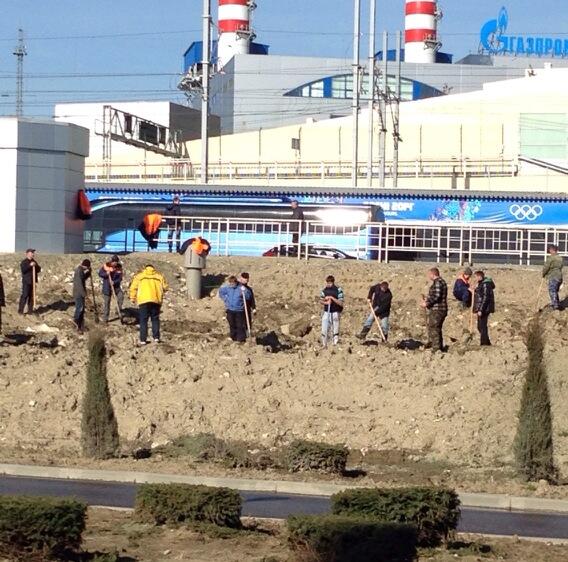Sochi Winter Olympic Games : #SochiProblems Stealing the Headlines
As video footage of stray dogs, and pictures of sewage leaks and unbuilt hotels fill the pages of newspapers and Twitter feeds worldwide, the full force of global media is focused on maximum embarrassment for Russia’s President Vladimir Putin. But has the media’s anti-Sochi stance gone too far ?
#SochiProblems Stealing the Headlines
Having visited 135 cities in the past 122 days, the Olympic torch has now arrived in Sochi. But before it has even been lit, the 22nd Winter Games have become the most talked about to date. Except nobody is talking about snowboarding, skiing has not yet been discussed, and the only bobsled going viral is the Canadian Institute of Diversity and Inclusion’s pro-gay advert: journalists have had so much more to talk about.

With opening ceremony of Olympics just five hours away, men are still hard at work in #Sochi – @ChrisKuc
This week – with embarrassment the key angle of coverage – lobby floors, doorknobs, light bulbs, curtain rails, dangerous water, uncovered manholes, unpaved streets, and the spray-painted grass of the Olympic Village were under the spotlight. The hashtag #SochiProblems has been mentioned more on social media than “Putin” or “Team USA”. A personalised Twitter account, @SochiProblems, retweeting every #SochiProblems mention, now claims over 201,000 followers.
Sochi Contentious from the Start
But the stories of Sochi’s problems started well before journalists started checking in.
As an underdeveloped and neglected summer resort town in the very southernmost area of Russia – bordering one of the world’s most volatile regions, the North Caucasus – the decision to select Sochi for the 2014 Winter Olympic Games has been contentious from the start. In one of the most highly militarised regions in Europe, the Olympic Village is a mountain away from an area of long-standing ethnic and territorial conflict, and home to terrorists-in-training. December 2013 saw twin suicide bombings in Volgograd – a major city just 430 miles north of Sochi. The ‘Caucasus Emirate,’ an alleged al-Qaeda associate, has promised to unleash ‘maximum force’ to disrupt the Sochi Winter Olympic Games. Sochi is now heavily guarded with a combination of security and military personnel, missiles, drones, and sea patrols, but fears still rest.
The run up to the Games has also chronicled reports of stray dogs rounded up to be culled, forced evictions of Sochi locals, unlawfully detained migrant labourers, and environmental destruction. It has also focused the world’s gaze on Russia’s Human Rights violations, most notably Putin’s 2013 discriminatory bill banning the promotion of information about “non-traditional” sexuality; a strong homophobic stance. And the building of the Games itself costing Russia a well-publicised $51 billion – a staggering $39 billion over budget, making it the most expensive in history – has served to highlight Russian corruption.
Has the Anti-Sochi Stance Gone too Far ?
But as #SochiProblems gains steam, and the athletes who have been training for years for this moment are thus far forgotten, has the anti-Sochi stance gone too far?
We are yet to hear about the isolated and ancient lands, set 3,000 metres above sea level in unique and spectacular mountainous scenery, covered by forests and plants from all parts of the globe.
Nor have we heard much about how the $51 billion (-ish, accounting for corruption) funnelled into Sochi aims to rejuvenate an area that has been in crisis for years : two Chechen wars, countless failed operations, and a larger and larger security presence, and Russia has still failed to find answers. The construction of an Olympic park, houses, 49 hotels, restaurants, bars, and coffee shops, 200 miles of new road, 55 bridges, 22 tunnels, thermo-electric power stations, and water purification plants have raised and connected an area from scratch. Tonight’s opening ceremony is not just the launch of the Games, but the launch of a programme intended to revive a whole region, and to develop tourism in the North Caucasus.
Sochi stands (almost) as Putin’s celebration of Russia’s resurgence, conspicuously shouting: “Russia is Back”.
Behind the Headlines
But is the dumping of sewage and dangerous water on the symbol of Putin’s Russia an ingenious case of humiliation as retaliation by journalists impotent to touch or change Russia’s real issues ? Or are we instead uncomfortable with Russia’s ambitions ?
Whichever it may be, let’s hope that, not only this Games passes without escalating violence – whether against gay-rights activists or in the form of terrorism – , but that also the Sochi infrastructure will serve to offer something new to this southern region of the country. And that, unlike in Sarajevo whose own Winter Olympic heritage is rusting and pock-marked, with exposed steel serving as a skeletal reminder of what once was, that Russia can build something positive.
















There are no comments
Add yours